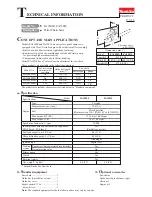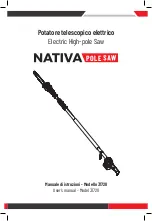
• Injuries caused by touching any rotating/moving parts.
• Injuries caused when changing any parts, blades or
accessories.
• Injuries caused by prolonged use of a tool. When using
any tool for prolonged periods ensure you take regular
breaks.
• Impairment of hearing.
• Health hazards caused by breathing dust developed
when using your tool (example:- working with wood,
especially oak, beech and MDF.)
Safety Guidelines/definitions
It is important for you to read and understand this manual.
The information it contains relates to protecting Your Safety
and Preventing Problems. The symbols below are used to
help you recognize this information.
Danger! Indicates an imminently hazardous
situation which, if not avoided, will result in death
or serious injury.
Warning! Indicates a potentially hazardous
situation which, if not avoided, could result in
death or serious injury.
Caution! Indicates a potentially hazardous
situation which, if not avoided, may result in minor
or moderate injury.
Caution! Used without the safety alert symbol
indicates potentially hazardous situation which, if
not avoided, may result in property damage.
Additional Safety Rules For Circular Saws
Warning! Some dust created by power
sanding, sawing, grinding, drilling, and other
construction activities contains chemicals known to
cause cancer, birth defects or other reproductive harm.
Some examples of these chemicals are:
• Lead from lead-based paints,
• Crystalline silica from bricks and cement and other
masonry products,
• Arsenic and chromium from chemically-treated lumber
(CCA).
Your risk from these exposures varies, depending on how
often you do this type of work. To reduce your exposure to
these chemicals:
• Work in a well ventilated area, and work with approved
safety equipment, such as those dust masks that are
specially designed to filter out microscopic particles.
• Avoid prolonged contact with dust from power
sanding, sawing, grinding, drilling, and other
construction activities. Wear protective clothing and
wash exposed areas with soap and water. Allowing
dust to get into your mouth, eyes, or lay on the skin may
promote absorption of harmful chemicals.
Caution! Wear appropriate hearing protection
during use. Under some conditions and duration of
use, noise from this product may contribute to hearing loss.
• Snagging the lower guard on a surface below the
material being cut can momentarily reduce operator
control. The saw can lift partially out of the cut
increasing the chance of blade twist. Ensure there is
sufficient clearance under the workpiece.
• When necessary to raise lower guard manually, use
the retracting lever.
• Keep the Blades Clean and Sharp. Sharp blades
minimize stalling and kickback. The use of dull and/ or
dirty blades can increase the saw loading causing the
operator to push harder which promotes twisting.
Caution! Laceration Hazard. Keep hands away from
cutting areas. Keep hands away from blades. Never place
hands in front of or behind the path of the blade while
cutting. Do not reach underneath work while blade is
rotating. Do not attempt to remove cut material when blade
is moving.
7
ENGLISH
(Original instructions)
Summary of Contents for STSC1618
Page 1: ...STSC1618 English Page 4 Turkish Page 14 Russian Page 24 Ukrainian Page 35...
Page 24: ...1 b 2 b d STANLEY STANLEY 24 f...
Page 25: ...25 3 a b d f g 4 a b c d c g f 5...
Page 26: ...d e f g h b c a b c d e 26...
Page 27: ...f g a b c d 27...
Page 28: ...EN 847 1 C D 28...
Page 30: ...5 16 10 11 8 10 15 11 10 5 C 1 21 1 30...
Page 31: ...M 17 18 19 E F N N 1 F 12 2 a 4 3 22 23 4 22 L 8 L STANLEY 185 15 8 31...
Page 35: ...b 2 b d f 3 a b STANLEY STANLEY 1 35...
Page 36: ...d f g 4 a b c d f g 5 a 36 b c d e f g...
Page 37: ...37 h a b c d e f g a b c d...
Page 38: ...I 38...
Page 39: ...EN 847 1 C D 39...
Page 41: ...1 8 10 11 15 10 5 C 41 1 21 L 8 L...
Page 43: ...Stanley Stanley Stanley Stanley Stanley www 2helpu com 43...








































